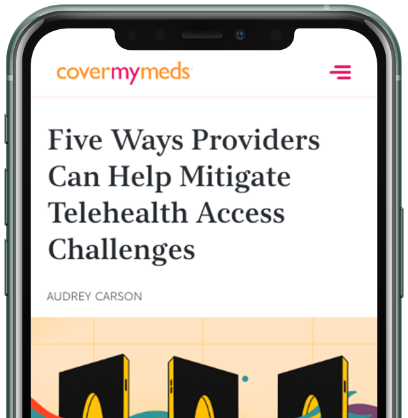What Providers Want from Pharma Field Reps Amid COVID-19 Pandemic
The COVID-19 pandemic had profound effects on how biopharma reps interacted with healthcare providers and shed light on how the industry needs to better meet the needs of providers. While shifting strategies to answer changing markets is nothing new to biopharma companies, the pandemic has changed conventional channels and methodologies.

With everything the COVID-19 pandemic has changed, one thing it hasn’t is the value physicians gain from trusted relationships with their biopharma sales reps.
While the pandemic shifted the ways in which sales reps and providers interacted, that trust remained at the core of the relationship — ensuring care remained unscathed by the pandemic.
It’s that trust and communication at the center of the relationship that will drive future growth — even with healthcare technology.
Virtual sales teams enable reps to continue to develop and nurture existing relationships while expanding the number the provider targets resulting in increased productivity and revenue.
For instance, in August 2020, research found physicians worldwide wanted more information on drug therapies and manufacturers’ support services because of the pandemic.
More than half of those surveyed said they were interested in learning about new therapies and were still connecting with reps despite the in-person restrictions in place at the time. Pharma Companies Have Improved How They Engage with Healthcare Providers During COVID-19, Finds New Research from Accenture, Accenture, Aug. 10, 2020 In fact, 61 percent said they were interacting more with their reps than before the pandemic. Reinventing Relevance, Accenture Healthcare Provider Survey, May 2020
The study also found providers are looking for financial assistance information and education about local access and care programs. Pharma reps who deliver that information to providers are rewarded with better relationships. Virtual sales models enable these key messaging and value-added services to reach an even larger target audience without added expense of face-to-face interactions.
Looking forward, some trends are likely to continue. Below, we’ll highlight a recent report that outlines changes the future might bring.
What’s next for pharmaceutical engagement with providers?
After relying on remote engagement during the pandemic, providers may prefer to continue engaging remotely with biopharma reps.
From all indications, it appears future biopharma engagement will be more remote, digital and informed.
Virtual sales will continue to provide a cost-effective alternative to expensive field sales models. Delivering key product messaging without the added expense.
Insights from the report suggest these relationships will change in three ways:
Provider preferences are trending toward virtual, which means traditional biopharma sales forces may be reduced or restructured in favor of remote channels.
Rather than focusing on relationship management, reps will need to offer more scientific engagement to make sure they’re adding value to the provider.
Remote detailing is here to stay as in-person detailing is at an all-time low. The proven success of virtual sales during the pandemic will continue to drive sales and open untapped market potential for companies that utilize this resource.
Put simply, biopharma companies will have to adopt new ways to communicate and engage with physicians to stay competitive. Companies will need to incorporate virtual sales into their sales organizations and core competencies.
Reps will need to quickly learn different channels, new types of engagements and customers, and shift investments based on what they’re learning in the marketplace. Biopharma reps will need to figure out new ways to interact with providers in deep and meaningful ways.
Much of this shift has been in the works for a long time, but the pandemic served as a catalyst to quickly shifting toward more digital interactions and other new ways of working.
Because providers still need and want new information about products and treatments, sales reps will need to be more agile and able to deliver messaging and content quickly and in ways that sync with how providers now prefer to interact.
By making use of virtual sales, for example, reps can maintain share of voice in a changing market and effectively increase that share of voice in a cost-effective way.
How can biopharma reps better meet the needs providers post-COVID-19 pandemic?
Even though much is still unknown about how and when we’ll recover from the pandemic, biopharma companies can still take steps to emerge even stronger and more vibrant than before.
McKinsey offers these insights as to how they can prepare for and succeed in an uncertain future. COVID-19 and commercial pharma: Navigating an uneven recovery, McKinsey & Co., April 21, 2020
Commercial teams should be tasked with focusing on the specific wants and needs of individual customers, including providers, patients and other stakeholders now and in the scenarios that lie ahead.
Establish a “reengagement control tower” across the business in each market. This group would use analytics to inform when to reengage, then monitor the reengagement dynamically for an agile response.
Conduct a scenario-based strategic-planning effort to prepare for widely different outcomes, everything from continued large-scale disruptions to a return to normal soon.
Mobilize strategic working groups to scale up and accelerate the changes that have been previously workshopped but haven’t had the resources or urgency to be pushed forward.
Virtual sales teams will also provide a competitive advantage by increasing the number of viable targets not previously called on by field sales teams. In addition to high decile targets, now medium and small potential targets can be added, allowing much larger coverage and market penetration without the added expense. Virtual sales reps can cover geographically as many targets as four to five field sales reps.
As the pandemic continues to change things for the biopharma commercial market, companies that are proactive in taking steps to retool their efforts to meet the new needs and expectations of their customers, such as embracing virtual sales, will be in the best position to succeed during the crisis and in the future, when the new normal is determined.
For more information about how technology is changing and improving how providers interact with patients and biopharma reps, download the 2021 CoverMyMeds Medication Access Report: Healthcare Technology edition.
The latest healthcare insights, floated right to your inbox.





